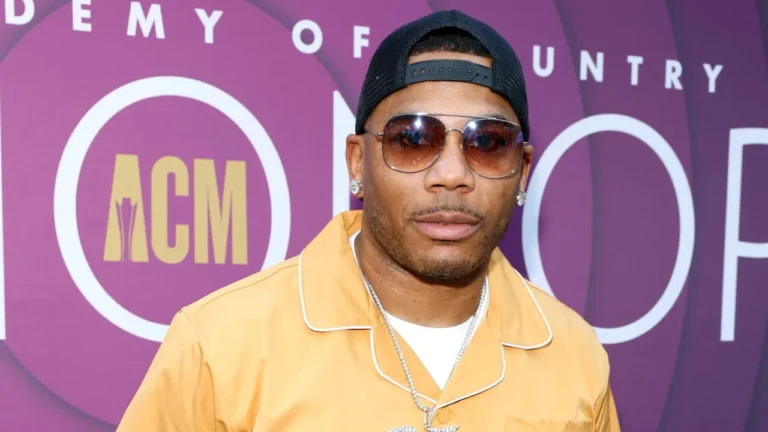In the ever-divisive world of celebrity politics, few moments have caused as much stir as Nelly’s decision to perform at Donald Trump’s presidential inauguration. While many artists openly declined invitations or protested the 45th president, Nelly, born Cornell Iral Haynes Jr., took the stage, triggering waves of backlash across the entertainment industry.
Now, as Donald Trump’s approval ratings continue to plummet to historic lows—hovering around 41% at his 100-day mark, the lowest of any U.S. president in over 70 years—Nelly is doubling down on his decision. The St. Louis rapper says his choice was never about endorsement but about respect for the office.
Choosing Unity Over Division
Speaking to Fox News at the Stagecoach Festival, Nelly expressed his views with characteristic optimism.
“I’m always looking at the glass half full,” he said. “I believe in bringing people together and making sure we all get what we need.”
This sentiment reflects Nelly’s broader approach to navigating the highly polarized political climate. While his decision was met with criticism, the rapper maintains that his performance was about national unity rather than political allegiance.
“He’s the President — he won,” Nelly emphasized, explaining that his performance was about respecting the institution of the presidency, regardless of who occupies the Oval Office.
Viral Backlash: Janelle Monáe’s Freestyle Diss
Despite Nelly’s attempt to depoliticize his performance, many fans and celebrities felt otherwise. The backlash reached a boiling point during a Grammy afterparty hosted by Anderson .Paak, when Janelle Monáe grabbed the mic and delivered an impromptu freestyle over Nelly’s iconic track Hot in Herre.
In a powerful moment caught on video and widely circulated across social media, Monáe didn’t hold back.
“You sold out for a stage and a check,” she rapped. “Some of us don’t get to choose if it’s hot in here—it’s hot out here every damn day for people like me.”
Monáe’s pointed freestyle called out what many saw as a betrayal of marginalized communities. Her criticism resonated deeply among progressive fans, reigniting debates about the role of artists in political discourse.
Standing His Ground: Nelly Speaks with Willie D
In an interview on the Willie D Live podcast, hosted by Geto Boys legend Willie D, Nelly further clarified his motivations.
“I’m not campaigning,” he told Willie D. “I respect the office, no matter who’s in it.”
Nelly compared his choice to perform to the duties of American soldiers, drawing a parallel between civic responsibility and his appearance.
“If our men and women can risk their lives for the office, I can perform for it,” he said.
Though this analogy struck some as a reach, it underscored his desire to position himself as someone who honors national tradition over partisan politics.
Missteps and Misquotes: Nelly’s Confused Defense of Trump
While Nelly attempted to distance himself from Trump’s controversial policies and rhetoric, his defense occasionally veered into confusion. He referenced lawsuits from Trump’s past to dismiss accusations of white supremacy, but then mistakenly brought up the 1994 Crime Bill—a piece of legislation championed by then-Senator Joe Biden, not Donald Trump.
These missteps did little to bolster his argument, and critics were quick to pounce on the inaccuracies as evidence of willful ignorance.
Still, Nelly remained unshaken.
“I’m not saying he doesn’t have messed up ways,” he admitted. “But he’s the President. I’m not telling you who to vote for—I’m just saying, he won.”
Divided Fans and Cultural Accountability
Nelly’s stance places him at the center of a larger cultural conversation about accountability, especially for Black entertainers navigating political affiliations. While some fans appreciated his attempts at neutrality, others were disappointed, arguing that neutrality in the face of injustice is a privilege not everyone can afford.
On social media platforms like X (formerly Twitter), the debate raged on.
“Nelly performing at Trump’s inauguration isn’t just about ‘respecting the office,’” one user tweeted. “It’s about legitimizing someone whose policies actively harm the communities that made Nelly famous in the first place.”
Others countered with a more forgiving perspective.
“Let’s not forget Nelly has done a lot for education and health care in underserved communities,” another fan pointed out. “One performance doesn’t erase years of service.”
The Artist’s Role in a Political Era
Nelly’s decision—and the firestorm it caused—touches on a larger issue in today’s entertainment industry: what role should celebrities play in politics? Should they stay neutral, or use their platform to influence change?
In an era where artists like Taylor Swift, Rihanna, and Cardi B have spoken out on everything from voter registration to racial justice, silence—or perceived endorsement of controversial figures—can be interpreted as complicity.
Yet, Nelly remains adamant that his choice was rooted in principle, not politics.
“I performed for the country, not the candidate,” he said in a follow-up statement. “If you want to make change, you can’t shut out the people you disagree with. You have to reach across.”
Final Thoughts: A Divisive Act of Patriotism?
As Trump’s presidency remains one of the most polarizing in modern history, Nelly’s performance continues to be dissected by fans, critics, and political commentators alike. Was it a patriotic gesture meant to honor tradition? Or a misjudged move that ignored the deeper implications of aligning with a controversial figure?
One thing’s for sure: in choosing to perform, Nelly made a statement—not just about politics, but about how celebrities choose to navigate them.
In the end, perhaps the real question isn’t whether Nelly should have performed, but how we as a culture define loyalty, accountability, and the limits of artistic expression in politically charged times.


